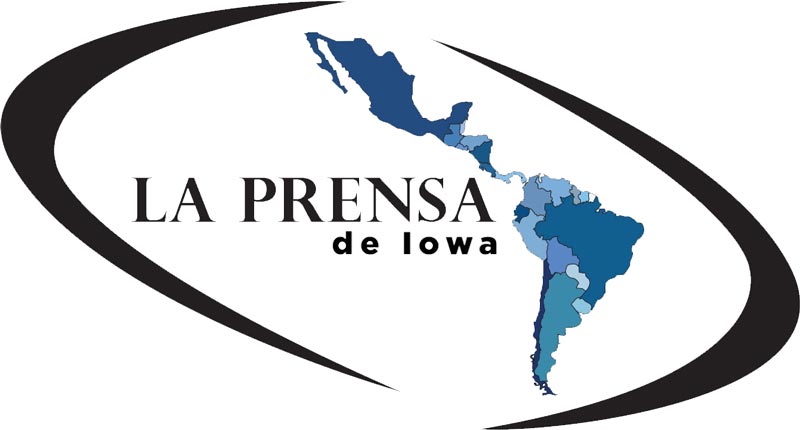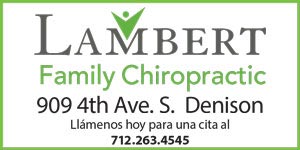Obispos de Iowa se pronuncian en contra de la ley de inmigración SF2340
/Residentes de diferentes lugares de Iowa se reunieron el día de ayer por la mañana en la capital de Iowa para pronunciarse en contra de la Ley FS 2340 frente a la sala del Tribunal Federal en Des Moines. Los manifestantes portaron pancartas con mensajes de: “No tenga miedo de marchar y pelea por la dignidad humana” “Detengan la SF 2340,” “Somos la fuerza de este país,” “Migrar es un derecho.” Foto cortesía Nils de Jesús Hernández.
Dawn Prosser
Diocesis de Sioux City
La gobernadora Kim Reynolds firmó el proyecto de ley SF 2340 sobre “entrada ilegal de ciertos extranjeros,” el que entrará en vigor el 1 de julio. A lo largo de la sesión legislativa, la Conferencia Católica de Iowa (ICC), la voz de política pública de los obispos católicos de Iowa, comunicaron que se oponían al proyecto de ley, señalando, entre otras preocupaciones, que el SF 2340 estaba “prevalecido por la ley federal y la Constitución de los Estados Unidos”.
La ICC explicó que la ley incluye sanciones penales para quienes hayan ingresado al estado y “no tengan autorización legal para estar aquí.” A partir del 1 de julio, será un delito menor agravado en Iowa que a una persona se le haya negado previamente la entrada al país o haya sido deportada. La ley también exige que los jueces deporten efectivamente a las personas “después de encontrar causa probable para un arresto conforme al proyecto de ley.”
“Es problemático que SF 2340 permita explícitamente a los funcionarios estatales procesar a un individuo por delitos de inmigración estatales, incluso si la solicitud de ayuda migratoria de esa persona está pendiente ante las autoridades federales,” publicó la ICC en su sesión legislativa del 24 de marzo.
En respuesta a la firma del proyecto de ley, los obispos de Iowa emitieron una declaración bilingüe el 1 de mayo, fiesta de San José Trabajador, expresando su preocupación por el efecto de la ley sobre “todos los inmigrantes y sus familias, no menos que los demás residentes de nuestro estado.” (ver barra lateral)
En respuesta a la ley, grupos de defensa realizaron manifestaciones pacíficas en cuatro comunidades de Iowa el 1 de mayo en oposición a la nueva ley, incluida la vigilia y manifestación por la Dignidad Humana frente a la Iglesia Católica St. Anthony en Davenport, una marcha en Iowa City organizada por Catholic Worker House y Escucha Mi Voz junto con una manifestación de inmigración frente al capitolio estatal en Des Moines.
Tom Chapman, director ejecutivo de la ICC, explicó que los obispos querían emitir la declaración para garantizar que “la gente esté consciente de que los obispos y por ende la iglesia están interesados y preocupados por todos los residentes del estado y su seguridad.”
Chapman señaló que los obispos han estado muy interesados en el tema migratorio durante décadas, “tratando de proteger y servir a las poblaciones inmigrantes en Iowa.”
Se sabe que algunas organizaciones y que el Departamento de Justicia de Estados Unidos planea presentar una demanda para bloquear la aplicación de la ley de inmigración de Iowa.
Oficina de Ministerios Multiculturales
El diácono Mark Prosser, director de la Oficina diocesana de Ministerios Multiculturales, y exjefe del Departamento de Policía de Storm Lake expresó que la SF 2340 es una ley problemática. “Hacer cumplir las leyes de inmigración a nivel estatal o local es una responsabilidad directa de la ley federal.” Agregó, “La ley es “muy vaga, está escrita de manera muy ineficiente y va a ser un problema.”
Mark Prosser se desempeñó como jefe del Departamento de la Policía de Storm Lake por más de 30 años, donde él y su departamento tuvieron amplio contacto con una gran diversidad de inmigrantes de todo el mundo. Actualmente, aparte de ser diacono también forma parte de la junta directiva del Foro Nacional de Inmigración.
“La realidad de este tipo de legislación a nivel local es que las personas, inmigrantes, solicitantes de asilo y refugiados que no entienden la ley, estén o no debidamente documentados, tendrán miedo. Los obligará a permanecer en las sombras de sus comunidades, de sus parroquias,” dijo Mark. “Dudarían más a la hora de comprometerse plenamente con sus familias y sus comunidades.”
El diácono dijo que cree que las autoridades de Iowa no han recibido instrucciones para hacer cumplir esta nueva ley de inmigración, ni las autoridades locales tienen acceso a bases de datos relacionadas con la inmigración para hacer cumplir la ley. Dijo que también cree que la ley conduciría a la discriminación racial.
“¿A quién le preguntas y a quién investigas para determinar si están documentados o no? Usted sabe que son las personas de color y las personas que hablan otros idiomas las que llevarán a las autoridades locales por el camino de la elaboración de perfiles no intencionados. Eso no sólo está mal, sino que es ilegal”, dijo el exjefe de policía.
El padre David Esquiliano, rector de la Catedral de la Epifanía, dirigió una vigilia de oración bilingüe en apoyo a los inmigrantes y en oposición a las nuevas leyes estatales de inmigración. Durante la vigilia, ofreció una oración en inglés y español basada en el mensaje del Papa Francisco para la 100ª Jornada Mundial de los Migrantes y Refugiados. Uno de los coros parroquiales interpretó himnos en español. Casi el 90% de los feligreses de la Catedral son hispanos. El padre David, quien también es inmigrante, resaltó la importancia de la solidaridad y el apoyo a la comunidad inmigrante. Dawn Prosser
Preocupaciones locales
Mark Prosser dijo que los pastores diocesanos le han comentado que la actual ley tiene a los feligreses preocupados. “Esto impone presiones adicionales a nuestras iglesias en todo el estado de Iowa, que brindan trabajo ministerial a las poblaciones de inmigrantes.” dijo.
El padre Paul Kelly párroco de las parroquias de Armstrong, Estherville, Emmetsburg y Graettinger, que a lo largo de su sacerdocio ha tenido experiencia con una densa población de feligreses de diferentes culturas, ha sido testigo de los efectos de las leyes antinmigrantes producen en sus feligreses, y espera que haya compasión en el trato a los inmigrantes.
“Hemos estado lidiando con estos temas de inmigración durante 40 años o más a nivel federal porque es un tema altamente polémico y conflictivo. Parece que no podemos hacer nada con eso. Desafortunadamente, los inmigrantes son los más afectados por no tener ningún progreso en el sentido de que realmente podamos tener reformas migratorias para ayudar a aliviar estos problemas que enfrentamos,” dijo el padre Kelly.
La Catedral de Sioux City es probablemente la parroquia más diversa de la diócesis, con aproximadamente un 86% de feligreses hispanos, junto con vietnamitas, africanos, micronesios y miembros de decendencia europea. El padre David Esquiliano, párroco de la catedral, dijo que cuando la gobernadora firmó la SF 2340, “fue entonces cuando el miedo se volvió real... había una sensación de perdición entre algunos de ellos[inmigrantes]”
El padre Esquiliano dijo que los párrocos no piden estatus migratorio a sus feligreses, y señaló: “Ese no es nuestro trabajo”. Sin embargo, los párrocos son conscientes de que pueden tener católicos indocumentados en los bancos.
“Sería ingenuo creer que no hay nadie en nuestra comunidad que se haya quedado más tiempo del permitido por la visa o que haya venido de otra manera. Esa no es sólo nuestra parroquia con hispanos. Podría ser con cualquier parroquia,” dijo. “Creo que a veces la gente lamentablemente olvida debido a toda la retórica política, que todos los inmigrantes no son hispanos, y que muchos europeos se quedan más tiempo de lo que la visa se los permite.”
El sacerdote dijo que la mayoría de la gente preferiría seguir la ruta legal para emigrar a un nuevo país. Sin embargo, debido al complicado sistema migratorio de Estados Unidos, algunos llegaron de otra manera “porque pensaban que en sus países no había otra manera de sobrevivir.”
El padre Mauro Sánchez, párroco de la parroquia Nuestra Señora de Guadalupe con iglesias en Sioux Center, Akron y Rock Valley, también ministra en una parroquia de feligreses de diferentes nacionalidades. Señaló que sus feligreses han estado preocupados desde antes de que se firmara la nueva ley de inmigración de Iowa.
Dijo que sus feligreses están muy preocupados de que puedan ser deportados, aunque tengan estatus legal en el país, simplemente por no tener sus documentos con ellos si las autoridades los detienen mientras conducen.
“Esto está causando que la gente entre en miedo, de que la gente se esconda en lugar de estar afuera disfrutando de sus vidas con sus hijos y sus familias,” dijo el padre Sánchez. “Están aquí trabajando duro. Necesitamos trabajadores, necesitamos gente que haga lo que otras personas no están dispuestas a hacer, y que acepten los trabajos que otras personas no aceptarán.”
Los pastores señalaron que la mayoría de los fieles se dan cuenta de que su iglesia es un refugio y que los sacerdotes y los obispos de Iowa se preocupan por su bienestar y están tratando de ayudarlos.
“Les digo a los fieles que sigan haciendo lo correcto, trabajando duro para darles a sus hijos un futuro mejor como lo hizo toda la gente que vinieron de Europa,” dijo el sacerdote de Nuestra Señora de Guadalupe.
“Como cristianos, amamos a todos,” dijo el padre Esquiliano. “Sí, la iglesia es la primera en apoyar que debe de haber leyes para proteger a la nación, pero simultáneamente, debemos amar a las personas sin importar el color de piel, el idioma e incluso el estatus migratorio.”
El sacerdote Nils de Jesús Hernández, párroco de la Parroquia Católica Reina de la Paz y director del Ministerio Hispano Católico de Waterloo, oró con sus feligreses para que la Ley SF 2340 sea declarada inconstitucional. Foto cortesía Nils de Jesús Hernández.
Translation
Iowa bishops speak out against immigration law SF2340
Residents from across Iowa gathered yesterday morning in Iowa's capital to speak out against FS 2340 in front of the Federal Courtroom in Des Moines. Protesters carried signs with messages: “Don't be afraid to march and fight for human dignity,” “Stop SF 2340,” “We are the strength of this country,” “Migration is a right.” Photo courtesy of Nils de Jesús Hernández.
Dawn Prosser
Diocese of Sioux City
Governor Kim Reynolds signed SF 2340 “unlawful entry of certain aliens” into law, which will go into effect July 1. Throughout the legislative session, the Iowa Catholic Conference (ICC), the public policy voice of the Catholic bishops of Iowa, communicated their opposition to the bill, noting, among other concerns, that SF 2340 was “ prevailed by federal law and the Constitution of the United States.”
The ICC explained that the law includes criminal penalties for those who have entered the state and “do not have legal authorization to be here.” Starting July 1, it will be an aggravated misdemeanor in Iowa for a person to have been previously denied entry into the country or deported. The law also requires judges to effectively deport people “after finding probable cause for an arrest under the bill.”
“It is problematic that SF 2340 explicitly allows state officials to prosecute an individual for state immigration crimes, even if that person's application for immigration relief is pending before federal authorities,” the ICC published in its legislative session on January 24. March.
In response to the bill's signing, Iowa's bishops issued a bilingual statement on May 1, the feast of St. Joseph the Worker, expressing concern about the law's effect on “all immigrants and their families, no less than the other residents of our state.” (see sidebar)
In response to the law, advocacy groups held peaceful demonstrations in four Iowa communities on May 1 in opposition to the new law, including a Human Dignity vigil and rally in front of St. Anthony Catholic Church in Davenport, a march in Iowa City organized by Catholic Worker House and Escucha Mi Voz along with an immigration rally in front of the state capitol in Des Moines.
Tom Chapman, executive director of the ICC, explained that the bishops wanted to issue the statement to ensure that “people are aware that the bishops and therefore the church are interested and concerned about all residents of the state and their safety. ”
Chapman noted that the bishops have been very interested in the immigration issue for decades, “trying to protect and serve immigrant populations in Iowa.”
It is known that some organizations and the United States Department of Justice plan to file a lawsuit to block the application of Iowa immigration law.
Office of Multicultural Ministries
Deacon Mark Prosser, director of the diocesan Office of Multicultural Ministries, and former chief of the Storm Lake Police Department, said SF 2340 is a problematic law. “Enforcing immigration laws at the state or local level is a direct responsibility of federal law.” He added, “The law is “very vague, very inefficiently written and it is going to be a problem.”
Mark Prosser served as Chief of the Storm Lake Police Department for more than 30 years, where he and his department had extensive contact with a wide variety of immigrants from around the world. Currently, apart from being a deacon, he is also part of the board of directors of the National Immigration Forum.
“The reality of this type of legislation at the local level is that people, immigrants, asylum seekers and refugees who do not understand the law, whether they are properly documented or not, will be afraid. It will force them to remain in the shadows of their communities, of their parishes,” Mark said. “They would be more hesitant to fully engage with their families and their communities.”
The deacon said he believes Iowa authorities have not been instructed to enforce this new immigration law, nor do local authorities have access to immigration-related databases to enforce the law. He said he also believes the law would lead to racial discrimination.
“Who do you ask and who do you investigate to determine if they are documented or not? You know that it is people of color and people who speak other languages who will lead local authorities down the path of unintentional profiling. That is not only wrong, it is illegal,” the former police chief said.
Father David Esquiliano, rector of the Cathedral of the Epiphany, led a bilingual prayer vigil in support of immigrants and in opposition to the state's new immigration laws. During the vigil, he offered a prayer in English and Spanish based on Pope Francis' message for the 100th World Day of Migrants and Refugees. One of the parish choirs performed hymns in Spanish. Almost 90% of the Cathedral's parishioners are Hispanic. Father David, who is also an immigrant, highlighted the importance of solidarity and support for the immigrant community. Dawn Prosser
Local concerns
Mark Prosser said diocesan pastors have told him that the current law has parishioners concerned. “This places additional pressures on our churches throughout the state of Iowa, which provide ministry work to immigrant populations.” he said he.
Father Paul Kelly, pastor of the parishes of Armstrong, Estherville, Emmetsburg and Graettinger, who throughout his priesthood has had experience with a dense population of parishioners from different cultures, has witnessed the effects of anti-immigrant laws on his parishioners, and hopes that there will be compassion in the treatment of immigrants.
“We have been dealing with these immigration issues for 40 years or more at the federal level because it is a highly contentious and contentious issue. We can't seem to do anything with it. Unfortunately, immigrants are the hardest hit by not having any progress in the sense that we can actually have immigration reforms to help alleviate these problems that we face,” Father Kelly said.
Sioux City Cathedral is probably the most diverse parish in the diocese, with approximately 86% Hispanic parishioners, along with Vietnamese, African, Micronesian, and members of European descent. Father David Esquiliano, pastor of the cathedral, said that when the governor signed SF 2340, “that's when the fear became real... there was a sense of doom among some of them [immigrants].”
Father Esquiliano said that parish priests do not ask their parishioners for immigration status, and noted: “That is not our job.” However, parish priests are aware that they may have undocumented Catholics in the pews.
“It would be naïve to believe that there is no one in our community who has overstayed their visa or who has come in another way. That's not just our parish with Hispanics. It could be with any parish,” he said. “I think sometimes people unfortunately forget, because of all the political rhetoric, that all immigrants are not Hispanic, and that many Europeans overstay their visas.”
The priest said most people would prefer to follow the legal route to immigrate to a new country. However, due to the complicated immigration system in the United States, some arrived in another way “because they thought that in their countries there was no other way to survive.”
Father Mauro Sánchez, pastor of Our Lady of Guadalupe parish with churches in Sioux Center, Akron and Rock Valley, also ministers in a parish of parishioners of different nationalities. He noted that his parishioners have been concerned since before Iowa's new immigration law was signed.
He said his parishioners are very concerned that they could be deported, even if they have legal status in the country, simply for not having their documents with them if authorities stop them while driving.
“This is causing people to become afraid, causing people to hide instead of being out enjoying their lives with their children and their families,” Father Sánchez said. “They are here working hard. We need workers, we need people who will do what other people are not willing to do, and who will take the jobs that other people will not take.”
The pastors noted that most parishioners realize that their church is a refuge and that Iowa priests and bishops care about their well-being and are trying to help them.
“I tell the faithful to continue doing the right thing, working hard to give their children a better future like all the people who came from Europe did,” said the priest of Our Lady of Guadalupe.
“As Christians, we love everyone,” Father Esquiliano said. “Yes, the church is the first to support that there should be laws to protect the nation, but simultaneously, we must love people regardless of skin color, language and even immigration status.”
Priest Nils de Jesús Hernández, parish priest of Queen of Peace Catholic Parish and director of the Waterloo Catholic Hispanic Ministry, prayed with his parishioners that Law SF 2340 be declared unconstitutional. Photo courtesy of Nils de Jesús Hernández.











































